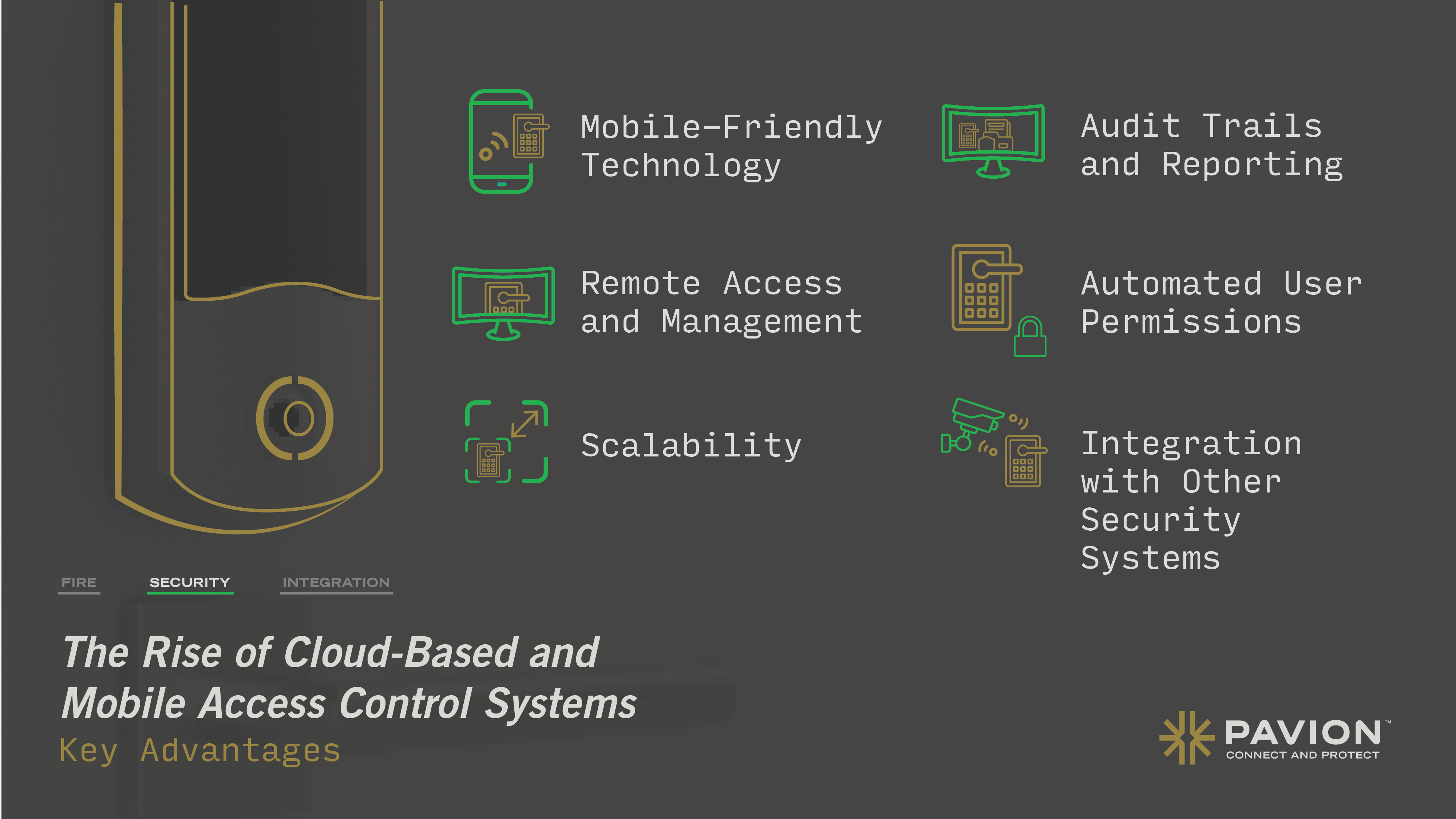
The Rise of Cloud-Based and Mobile Access Control Systems
In recent years, the demand for more flexible, scalable, and efficient security solutions has led to significant changes in the way businesses and organizations approach access control. Traditional security systems that relied on physical keys, card swipes, or wired connections are being replaced by more advanced cloud-based and mobile access control systems. These modern solutions offer enhanced security, flexibility, and convenience for businesses of all sizes, allowing them to manage their access control remotely, at any time and from anywhere.
Cloud-based and mobile access control systems are becoming the norm in the security industry, thanks to the ongoing shift towards digital transformation. These solutions enable organizations to not only enhance their security infrastructure but also streamline operations, improve customer experiences, and reduce operational costs. In this article, we will explore the growing trend of cloud-based and mobile access control systems, focusing on their advantages, key features, and why they are becoming the preferred choice for many businesses.
Understanding Mobile Access Control Systems
At its core, a mobile access control system allows users to unlock doors and manage access to secure areas using their smartphones or other mobile devices. This innovation marks a significant departure from traditional systems, which often require physical cards, keys, or fobs to operate. Mobile access control systems utilize Bluetooth, NFC (Near Field Communication), or other wireless technologies to provide seamless, contactless access to secure spaces.
Users can interact with the system through mobile apps, which can be installed on their smartphones, tablets, or other mobile devices. These apps communicate with the access control hardware via a cloud-based platform, allowing users to unlock doors, monitor security events, and grant or revoke access remotely. The system may also integrate with other security components such as video surveillance, alarms, and sensors to create a fully integrated security solution.
The appeal of mobile access control systems lies in their ability to simplify day-to-day security operations. Employees no longer need to carry physical access cards, which can be easily lost, stolen, or duplicated. Instead, they can rely on their smartphones to handle all their access needs, reducing the risk of unauthorized access and enhancing overall security.
The Power of Cloud-Based Access Control
Cloud access control systems take the convenience of mobile access to the next level by allowing organizations to manage and monitor their security infrastructure remotely through a cloud-based platform. This cloud-based approach offers significant benefits over traditional on-premise access control systems, which require dedicated servers, hardware, and software installed on-site.
One of the most significant advantages of cloud-based access control systems is their scalability. With a cloud-based solution, businesses can easily expand or reduce their access control infrastructure as needed without the need for additional hardware or extensive system upgrades. Whether a company is opening new offices, adding new doors, or upgrading to more advanced security features, cloud access control systems can be adapted to meet their evolving needs.
Cloud access control systems also provide enhanced flexibility. Administrators can access the system from any location with an internet connection, allowing them to manage user access, monitor security events, and review audit logs in real-time. This flexibility is particularly beneficial for businesses with multiple locations, as it enables centralized management of access control for all sites. Moreover, the ability to grant or revoke access remotely can significantly improve operational efficiency, allowing businesses to respond quickly to security breaches, staffing changes, or other security-related events.
In addition to flexibility and scalability, cloud access control systems offer superior reliability. Since the system is hosted in the cloud, businesses do not have to worry about hardware failures, power outages, or other on-premise issues that could disrupt access control. Cloud providers typically offer high levels of data redundancy and backup, ensuring that the system remains operational even in the event of a disaster. This reliability is crucial for businesses that rely on their access control systems for day-to-day operations.
Rich Campbell, Training & Development Specialist working in Pavion operations stated why adopting cloud based access control makes sense for a business.
“Cloud based access control systems are very cost efficient. They allow customers to shift what was traditionally a large capital expenditure to a monthly subscription fee which can be managed using their operating budget.”
Remote Access Video Surveillance Integration
As businesses seek to create more comprehensive security solutions, the integration of mobile access control systems with remote access video surveillance is gaining popularity. Video surveillance is a key component of modern security infrastructure, providing visual monitoring of secure areas and deterring potential threats. By integrating video surveillance with mobile access control systems, businesses can enhance their security capabilities by offering a more holistic view of their premises.
With remote access video surveillance integration, administrators can view live video feeds from security cameras in real-time, directly from their mobile devices or cloud-based control panels. This integration allows security teams to respond more effectively to incidents, as they can assess the situation visually and take appropriate action—whether that involves granting access to authorized personnel or alerting law enforcement.
In addition to improving incident response, the combination of mobile access control and video surveillance offers a more streamlined user experience. For example, when an employee requests access to a secure area, a security administrator can verify their identity using live video feeds from nearby cameras before granting access. This added layer of verification helps ensure that only authorized individuals are allowed into restricted areas, reducing the likelihood of unauthorized access or security breaches.
Key Features of Cloud and Mobile Access Control Systems
Modern mobile access control systems come with several key features that set them apart from traditional access control solutions. These features contribute to their growing popularity among businesses seeking to enhance their security and streamline their operations.
- Mobile-Friendly Technology: The most obvious feature of mobile access control systems is their ability to be managed and operated via smartphones and mobile apps. This allows businesses to eliminate the need for physical access cards, making the entire access control process more convenient and secure.
- Remote Access and Management: Cloud-based systems allow administrators to manage access and monitor events remotely from any location with internet access. This flexibility enables real-time monitoring, quick response to incidents, and centralized control over access to all secure areas.
- Scalability: Cloud-based solutions can be easily scaled to accommodate the growth of a business. Whether adding new doors, new locations, or additional users, cloud access control systems can be adjusted with minimal effort and cost.
- Integration with Other Security Systems: Mobile access control systems can be integrated with other security features, such as video surveillance, alarms, and sensors. This creates a more comprehensive security solution that improves overall situational awareness and incident response.
- Audit Trails and Reporting: Cloud access control systems provide detailed audit trails and reporting features, allowing businesses to track access events, generate compliance reports, and monitor user activity. These reports are invaluable for maintaining regulatory compliance and investigating security incidents.
- Automated User Permissions: Cloud-based systems allow for the automatic assignment and management of user permissions. This ensures that employees only have access to the areas they are authorized to enter, improving security and reducing the potential for human error.
Campbell also spoke about how cloud based access control systems enhance the overall experience of visitors and guests of your customer’s business. “As a cloud-based service, there are many different ways to link different cloud based services together and create a seamless experience. For example, you can use your access control system to invite a guest to your facility. They would then receive an email with a QR code which they can scan when they arrive at the building. They can also receive an email ahead of time with what to expect and a link to a web page which covers all their parking options, food options, and information about their host who is inviting them.”
Why Cloud Access Control is on the Rise
The rise of cloud-based and mobile access control systems can be attributed to several factors, all of which point to the growing demand for more flexible, scalable, and cost-effective security solutions.
Cost Efficiency: Cloud-based access control systems eliminate the need for expensive on-site hardware and infrastructure. This makes them more affordable for businesses of all sizes, from small startups to large enterprises.
Flexibility and Convenience: The ability to manage access remotely, from any location and using a mobile device, provides unmatched flexibility. Organizations can grant or revoke access instantly, monitor events in real-time, and streamline day-to-day security operations.
Increased Security: Mobile access control systems are inherently more secure than traditional access methods, such as physical cards and keys. With features like two-factor authentication, encrypted communication, and remote deactivation of lost or stolen devices, businesses can ensure that their access control systems are more robust and less susceptible to breaches.
Future-Proofing: As businesses continue to adopt digital transformation initiatives, cloud-based solutions offer a future-proof approach to security. These systems can be easily updated with new features, integrations, and technologies, ensuring that businesses are always equipped with the latest security tools.
The rise of cloud-based and mobile access control systems is transforming the way businesses manage security and access to their premises. These modern solutions offer numerous benefits, including increased flexibility, remote management capabilities, cost efficiency, and enhanced security. By adopting mobile and cloud access control systems, businesses can create more streamlined and effective security infrastructures that are better suited to the demands of the modern world.
Learn why cloud access control is on the rise! Embrace the future of security today and discover how mobile access control systems can revolutionize your organization’s access management.
